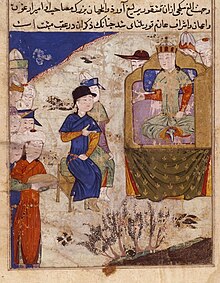Möngke Khan
Möngke Khan ( Mongolian ᠮᠥᠩᠬᠡ , temple name Xianzong 宪宗 , Xiànzōng , * 1209 ; † August 11, 1259 on Diaoyu Mountain ( 钓鱼 山 ), in today's street district Diaoyucheng of the Hechuan district in Chongqing ) was the son of Toluis and grandson of Genghis Khan the fourth khagan of the Mongols . He ruled Mongolia from 1251 to 1259 and, despite increasing problems, was able to hold the huge empire together.
Life
Möngke was one of the princes who took part in the great campaign in Europe (1236-1241). In 1238 he pacified the Cumans (Kyptschaken, Polowezer) on the Volga by capturing their khan Batschman.
After the death of the kagan Güyük in 1248, he was brought into play as a possible khagan by the khan of the Golden Horde , Batu, and his own mother Sorghaghtani , but negotiations and intrigues on this dragged on until 1251.
Eventually he was elected (in the absence of some important Genghisid princes) and consolidated his power by disempowering and exiling or executing the heir to the throne of the house of Ögedei Khan following a conspiracy. These purges also affected the Chagatai princes , several officials and troop leaders and did not go off peacefully. Möngke had to send an army under the Emir Bürilgidai to Turkestan. Batu Khan became Möngke's co-regent and was largely spared from his administrative measures, which in the medium term favored the division of the Mongol Empire, but initially stabilized Möngke's power in the entire empire.
The abundance of power Möngke Khaqan in Karakorum enabled the continuation of expansion in Persia (see caliphate ) and in southern China (see Song dynasty ) through his younger brothers Kubilai and Hülegü and also a visible improvement in administration from 1253 to 1259 . Relevant key points are a tax reform by Mahmud Yalawatsch with grading of taxes according to the solvency of those affected and the expansion of the bureaucracy through new capable heads in the administration (especially in China).
Under Möngke Khan a group of princes made their mark, which also pursued regional goals. Above all, Batu's brother Berke Khan first adopted Islam in the interests of trade , and Prince Kubilai represented the interests of northern China (on the question of tax levels) against Möngke's officials. In these intrigues and propaganda measures, the later break-up of the empire became apparent, because Kubilai had serious problems with the ruling clique at Möngke's court as a result in 1257/1258. She had him deposed and the heads of his civil administration executed. And Berke, as a devout Muslim, expressed his disapproval of the elimination of the Baghdad caliphate in 1258 by minting coins with the name of a deceased caliph in his sphere of influence.
The Flemish Franciscan , missionary and envoy Wilhelm von Rubruk stayed at Möngke's court in 1253/1254 , who also took part in a major religious dispute of the Khagan.
Möngke Khan died on August 11, 1259 during a China campaign during the siege of the Diaoyu fortress in Sichuan, possibly of dysentery . Chinese sources also mention an arrow wound as an alternative.
literature
- JA Boyle : Genghis Khan. The History of the World Conqueror . Manchester 1997 (the translation by Ata-Malik Juvaini ).
- JA Boyle: The successors of Genghis Khan . New York / London 1971 (the translation of Raschid ed Din ).
- Felicitas Schmieder : Customer from the Mongols . Sigmaringen 1997 (the text by Johannes de Plano Carpini ).
- Manfred Taube (ed.): Secret history of the Mongols. Origin, life and advancement of Činggis Qans. Kiepenheuer u. Witsch, Leipzig et al. 1989, ISBN 3-378-00297-2 .
- René Grousset : The steppe peoples . Essen 1975.
Remarks
- ↑ A shepherd discovered wagons with weapons on their way to Karakoram during the election celebrations. Some followers of the Ögedei family then pleaded guilty to the attempted coup d'état (weapons were forbidden in the election) and Möngke started a criminal court against potential rivals. Subsequently executed persons include: a. the Tschagatai-Khan Yesun Möngke, Güyüks widow Ogul Qaimish, the Chancellor Chinqai and the prince Schiramun, a grandson of Ögedeis.
- ↑ At that time it represented a tremendous propaganda measure and he had to have it re-stamped on Möngke's orders. See GA Fedorow-Dawydow: The Golden Horde and its predecessors, Leipzig 1972.
| predecessor | Office | successor |
|---|---|---|
| Ogul Qaimish - (interim reign, 1248 –1251) Güyük Khan |
Mongolian Khagan 1251–1259 |
Kublai Khan |
| personal data | |
|---|---|
| SURNAME | Möngke Khan |
| BRIEF DESCRIPTION | fourth Mongolian khagan |
| DATE OF BIRTH | 1209 |
| DATE OF DEATH | August 11, 1259 |
| Place of death | Sichuan |
